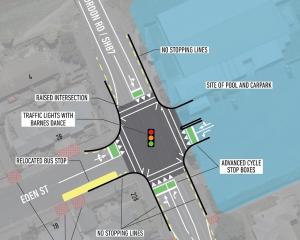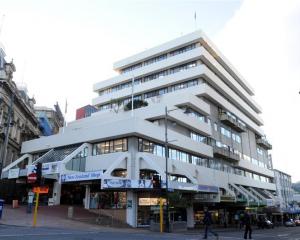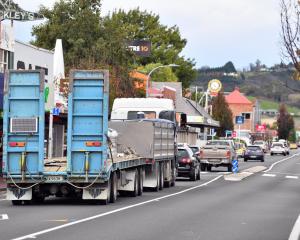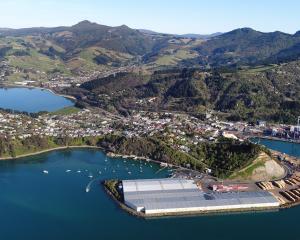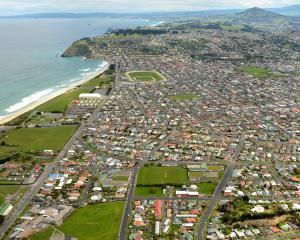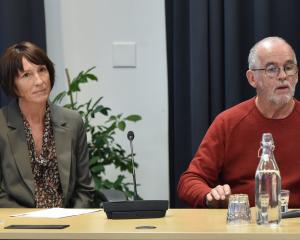But already the role has taken him to London, in search of better insurance for the council, and brought him face-to-face with some of Dunedin's biggest headaches, including the city's loss-making stadium.
But speaking to the Otago Daily Times, Mr McKenzie (44) said he was enthusiastic about making a difference in his new council role.
He arrived at a time of change, having been appointed by former chief executive Paul Orders amid a management restructure late last year.
He began work in January, shortly after the appointment of Mr Orders' replacement, Sue Bidrose, and dealing with a new council and Mayor Dave Cull beginning his second term.
Mr McKenzie said his new role was a ''huge opportunity'' to make a difference within the council and the wider city.
''I think that's a really good space to come into council, and I think we can make a real difference. I love Dunedin - it's basically my home town, and I want to see it succeed.''
Mr McKenzie, a chartered accountant, has a background in public and private roles, including as a company director, former group accountant for Allied Press Ltd - owner of the ODT - and as the University of Otago's director of financial services.
He held his university role for eight years, until he was recruited to join the council, ahead of 27 other candidates for the role.
His new role sought to bridge a communication gap between it and its companies, which Mr Orders last year said suffered from a ''silo-based approach to financial management''.
The aim was to avoid surprises like the multimillion-dollar shortfall in dividend payments from DCHL to the council which sent shockwaves through the council in 2011 and led to a governance restructure.
Mr McKenzie said he operated a ''no surprises'' approach, whether news was good or bad, which relied on open and transparent communication.
The companies together contributed about $10.45 million a year to the council, through dividends and interest payments, which was a significant chunk of the council's annual operating budget, he said.
That made the relationship between the companies and the council ''quite crucial'', and realistic expectations were needed on both sides, he said.
''We have seen in the past that hasn't always been the case.''
The companies had bought into the new approach so far, and their most recent financial results showed they were heading in the right direction, he said.
There were big issues still to address and the Forsyth Barr Stadium review - due for completion in the middle of the year - was among the key ones.
However, the size of the stadium's forecast losses - beginning with $1.4 million in 2014-15 - needed to be kept in perspective, compared with the council group's $440 million turnover and $3.8 billion worth of assets, he believed.
Mr McKenzie was also working on a new group financial strategy which could be ready in time for next year's council long-term plan budget hearings, and which could help address the council's debt position.
Together, the council and its companies had about $612 million of debt, although that was already due to begin declining.
The council's share stood at $264 million in 2013-14, but was due to drop to $258 million over the next financial year, as the council worked to reduce the bill below $200 million by 2021.
The council and its companies were always likely to have some debt, but the new strategy would help shape the consolidated debt position for the years ahead, he said.
The council was also seeking savings elsewhere, including exploring greater use of shared services by its companies to achieve efficiencies, he said.
He was working with two companies in particular - which he would not name - on an initiative in that area, the results of which would be known in a few months, he said.
The council - like others around the country - was also still grappling with a long list of uninsured above and below-ground assets, together worth at least $1.6 billion, following the Canterbury earthquakes.
That prompted Mr McKenzie's trip to London last month for meetings with 15 representatives from specialist insurance market Lloyds of London, including All Blacks sponsor AIG.
Mr McKenzie said the trip aimed to improve the scope and cost of the council's existing cover, while spreading it between New Zealand and international insurers. That would help ensure there was capacity to meet any claims by the council following a major event, he said.
The Lloyds insurers had responded positively to the council's approach, but deals were yet to be offered, and the council had until June 30 to renew existing contracts or accept new ones, he said.
Grant McKenzie (44):
- Dunedin City Council's group chief financial officer.
- Started work January 2014.
- Aims to bridge communication gap between council and its companies.
- Chartered accountant, company director and member of Institute of Directors.
- Former Allied Press group accountant and University of Otago director of financial services.


